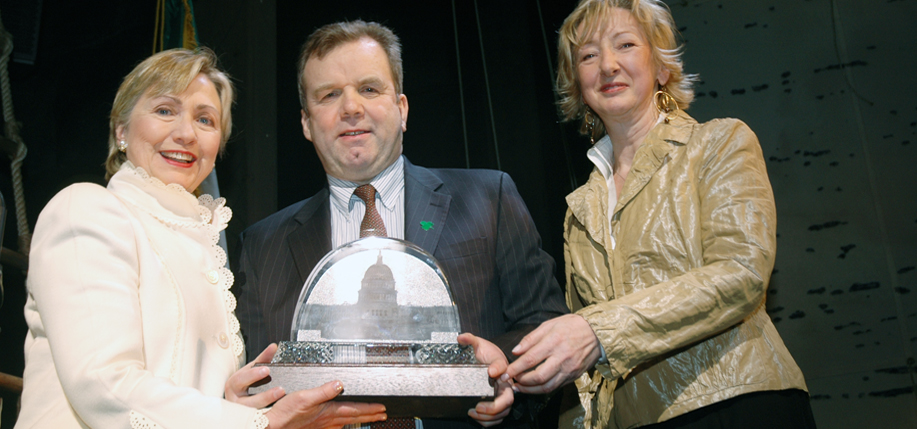Our cover story on Hillary Clinton reminds us of her role in the Irish peace process – particularly her involvement in bringing women into the discussion and throwing a light on the role they played in their communities – work that was often under-recognized.
Closer to home she taught me a lesson that opened my eyes to the fact that when it comes to giving women their due, we women can sometimes fall short ourselves.
I cringe as I remember the incident. The former First Lady, then the newly elected senator from New York, was attending our annual Top 100 affair at the New York Plaza. As she waited to go on stage, Hillary asked me what other politicians were in the room. In my quick scan of the seated guests my eyes took in Congressman Peter King, former Senator George Mitchell, and several other male political figures whose names I passed on to Senator Clinton.
Somehow I managed to miss Mary Harney, the Tánaiste (Irish deputy prime minister), and Hillary therefore didn’t mention her in her remarks.
Following Hillary to the podium was our publisher Niall O’Dowd, who did mention the Tánaiste.
Hillary, who had by now taken her seat in the audience, threw me a look that I will never forget. All I could do was mouth the words, “I’m sorry.”
How had I failed to see Mary Harney sitting in the front row? Why was it that only the male politicians had stood out in my mind as worthy of note?
Was there some deeply buried prejudice in the fabric of my being that saw men as more important? And if so, was it a condition of growing up in Ireland at a time when women were treated like second-class citizens? Even in the late 1970s women had to leave civil service jobs when they married and couldn’t get a bank loan without a male relative as a guarantor. Contraception was outlawed, and job choices and chances of higher education were fewer for women.
In any case, Hillary made me check myself, and now I do it often. I’ve come to realize that it’s easier to recognize gender discrimination at a distance – in Afghanistan or some such place. It’s not always easy to see it when it’s right under your nose.
The lot of women was especially hard in Northern Ireland during the Troubles. With husbands in jail for “revolutionary”
offenses, or refusing to take jobs where they were asked to swear allegiance to the Queen, it was the women who held home and family together. And when it came to the peace talks the few women representatives were often shouted down when they offered an opinion – their roles domesticated and undervalued.
And then came Hillary, who met with women from both communities and sat and listened to the details of their lives. (As George Mitchell who chaired the peace talks said, “[Hillary] was very much involved in encouraging the emergence of women in the political process in Northern Ireland, which was a significant factor in ultimately getting an agreement.”) She visited with women in Belfast, and as First Lady invited them to the White House. When she became Secretary of State she stayed in touch and continued to travel to Northern Ireland.
As genealogy detective Megan Smolenyak shows in her exploration of Hillary’s Celtic roots in this issue, the former secretary (seven of whose great-grandparents were immigrants) comes from a lineage of women who were determined to pull through adversity. And if she’s elected president, not only women, but disparate people from every corner of the world, will benefit from her inclusive vision.
For all this pondering on the role of women, I have to admit that I’ve had wonderful champions who happened to be male. Not least, the all-seeing, all-knowing Donald Keough, who rightfully was our very first inductee into the Irish America Hall of Fame. Without Don’s encouragement and support I might not still be involved with Irish America. In fact, there might not be an Irish America at all. He created an environment conducive to a publication such as ours and helped ignite the now global Irish Studies phenomenon when he funded the Institute for Irish Studies at Notre Dame in 1992. As publisher Niall O’Dowd has said, “There are two Irish Americas. One before Don, and one after.” We are disconsolate at his passing.
Don also supported our Irish America Hall of Fame which is situated on the quayside in New Ross from where his ancestor Michael Keough left for the New World, and where this year’s honorees, all of whom have supported Irish America in different ways, will soon be installed.
Inductee Bob McCann has encouraged women in the financial industry, and supported education in Northern Ireland; Emmett O’Connell is a fount of wisdom and knowledge on all things Irish and has given me invaluable insights over the years; and Pat Quinn, who initiated the Ice Bucket Challenge, has united men, women, and children in a fun way to raise money for ALS research. Congratulations to all.
We include in this issue, too, a Roll of Honor from the past – a story on the Irish who fought in WWI, and lots of features on art, culture, and music, including one that’s sure to cheer the heart – a profile of Joanie Madden whose phenomenally talented group Cherish the Ladies is celebrating its 30 year anniversary.
And cherish the ladies we shall.
Mortas Cine. ♦


Leave a Reply